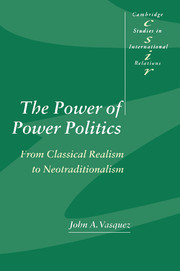Book contents
- Frontmatter
- Contents
- List of figures
- List of tables
- Preface
- Introduction
- Part I The Original Text: Classical Realism and Quantitative International Politics
- Preface to Part I
- Acknowledgments
- 1 The role of paradigms in scientific inquiry: a conceptual framework and a set of principles for paradigm evaluation
- 2 The role of the realist paradigm in the development of a scientific study of international relations
- 3 Research design: defining and operationalizing the realist paradigm
- 4 Theory construction as a paradigm-directed activity
- 5 Data making as a paradigm-directed activity
- 6 Research as a paradigm-directed activity
- 7 Evaluation: the adequacy of the realist paradigm
- 8 Theory and research in the 1970s: the emerging anomalies
- Part II Neorealism and Neotraditionalism: International Relations Theory at the Millennium
- References
- Name index
- Subject index
- CAMBRIDGE STUDIES IN INTERNATIONAL RELATIONS
8 - Theory and research in the 1970s: the emerging anomalies
Published online by Cambridge University Press: 22 September 2009
- Frontmatter
- Contents
- List of figures
- List of tables
- Preface
- Introduction
- Part I The Original Text: Classical Realism and Quantitative International Politics
- Preface to Part I
- Acknowledgments
- 1 The role of paradigms in scientific inquiry: a conceptual framework and a set of principles for paradigm evaluation
- 2 The role of the realist paradigm in the development of a scientific study of international relations
- 3 Research design: defining and operationalizing the realist paradigm
- 4 Theory construction as a paradigm-directed activity
- 5 Data making as a paradigm-directed activity
- 6 Research as a paradigm-directed activity
- 7 Evaluation: the adequacy of the realist paradigm
- 8 Theory and research in the 1970s: the emerging anomalies
- Part II Neorealism and Neotraditionalism: International Relations Theory at the Millennium
- References
- Name index
- Subject index
- CAMBRIDGE STUDIES IN INTERNATIONAL RELATIONS
Summary
Introduction
The synoptic analysis presented in chapter 7 is not intended to supplant traditional literature reviews and assessments of research but to supplement them by providing a test design that will make claims about the adequacy of theory and paradigms subject to the principle of falsifiability. There are limitations to such an approach, however. As the two ad hoc explanations on measurement error and youthfulness of the field make clear, any body of evidence is subject to interpretation, even if only on the question of how much emphasis to put on the evidence. Rather than treating each finding equally, as the predictive power indices do, it might be argued that it would be more proper to place a different weight on research depending on the validity of its research design and the theoretical significance of its findings. After all, it might be argued that even in the physical sciences one or two important experiments, like the Michelson–Morley experiment or the investigations leading to the decoding of DNA, are much more important than the vast multitude of work published in a field. Although most of the flaws with which this potential criticism is concerned would be eliminated by the test on the criterion of scientific importance, there is merit in systematically reviewing research to see if it is consistent with findings from a databased and more synoptic approach.
- Type
- Chapter
- Information
- The Power of Power PoliticsFrom Classical Realism to Neotraditionalism, pp. 154 - 180Publisher: Cambridge University PressPrint publication year: 1999



